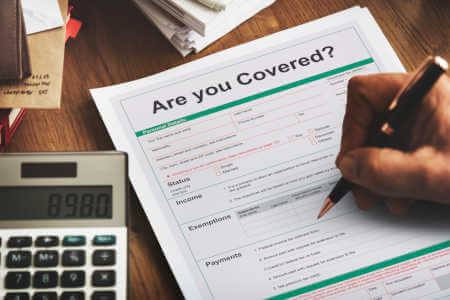Renters Insurance Policy
What Is Renters Insurance Policy? Renters Insurance coverage protects your personal property against fire, theft, and vandalism. Renter’s insurance also protects you for liability coverage in case someone is injured while on your property.
It also protect you against a liability lawsuit if you are responsible for injuring a person or damaging another person's property, regardless of where the incident occurs.
Is Renters Insurance coverage legally required?
No, Unlike a homeowner who is required by their mortgage company to buy home insurance, renters insurance is not legally required, but your new landlord can still require you to have it. Today 75% of landlords and professional property management companies will require proof of renters insurance coverage as part of their lease agreement.
If you are required to have Renters Insurance coverage, it will usually be written into your lease agreement, and they may ask for proof of renters insurance when you sign your lease or pick up your keys.
Who needs renters insurance?
Anyone who rents an apartment, condominium or a home
Former homeowners who may be downsizing to an apartment
College students not covered by parent's homeowners policy.
How much renters insurance do you need?
How much renters insurance you need depends on the property you want to protect and the hazards you would like to be insured from. Talk to your insurance agent or company. Your agent will be able to provide you some guidance based on your specific needs.
What does renters insurance cover

Fire - Renters insurance will reimburse you for personal property destroyed by a fire and cover property damages incurred by someone else if the fire spreads outside your rental.
Burst Water Pipe - Water damage to your possessions from a burst water pipe is typically covered under your renters insurance policy.
Theft - Renters insurance typically protects items stolen after a break-in at your rental property or items stolen outside of your rental housing unit, such as items stolen from a car or locker.
Personal Liability - Personal liability coverage is part of a standard renters insurance policy. It may help pay for another person's medical bills if you're found legally responsible for their injuries.
Earthquake - Typically, earthquake damage is exempt from coverage by renters insurance. However, an earthquake insurance policy may be available at an additional cost.
Loss of Use Coverage - Loss of use covers living expenses if your home is damaged to the point of being unliveable. Costs like hotel, food, and other living expenses you may incur would be covered.
Consider Purchasing a Rider - If you have renter's insurance, you can purchase an extension, also called a rider, that covers expensive items, such as wedding or engagement rings, for additional coverage.
What is included in Renters Insurance Policy
Most renters insurance policies can include the following coverage types:
Personal Property (Coverage C)
Personal Property (Coverage C) provides protection for the contents of your home and other personal belongings owned by others who live with you. It pays if your personal property is damaged or destroyed by a covered loss (items such as furniture and clothing). For instance, having your apartment broken into, items stolen and your furniture vandalized. Many insurers have a minimum limit for personal property coverage, such as $15,000 or $20,000. While that amount may be sufficient, it’s worth taking the time to inventory your belongings to gauge their worth and see if you need more coverage.
Loss of Use (Coverage D)
Loss of Use (Coverage D) pays your additional living expenses (costs above and beyond your normal and customary living expenses for housing, food, and other essential expenses) if you need to relocate temporarily due to damage. For example, if your apartment cannot be lived in while being repaired or rebuilt after a covered loss. In such a case, the additional living expenses coverage will help cover extra costs you incur, like staying in a hotel or boarding a pet. You must keep receipts for all additional living expenses and submit them to your insurance company for reimbursement consideration.
Personal Liability (Coverage E)
Personal Liability (Coverage E) pays others for bodily injury and property damage, and your legal costs when you or a resident of your household are sued due to accidental injury to others and/or damages to the property. A standard policy includes up to $100,000 in Personal liability coverage but you may need more if you have higher assets.
Medical Payments Coverage (Coverage F)
Medical Payments to Others (Coverage F) "also called goodwill coverage" pays for reasonable and necessary medical expenses of people who get injured on your property (apartment or rental house), regardless of who was at fault. (this excludes the resident members of your home) It might also pay for some injuries that happen away from your rental, such as your dog biting someone at the park. You can typically get $1,000 to $5,000 in medical payments coverage.
Myths about renters insurance

"Renters insurance is too expensive, and I already have enough bills to pay."
The average renters insurance policy costs between $15 and $30 per month. Replacing all of your possessions or being liable for someone being injured on your premises will cost much more.
"I don't have that many valuables."
Even a minimal number of small household appliances can add up to more than you realize and if you add in expensive sound systems and clothing, the cost to replace your belongings could be much higher than you think.
"My landlord has insurance, so I'm already protected."
The landlord’s insurance does not extend to your personal property, nor does it protect you from being liable for damage you
might cause to the building (e.g., a kitchen fire or a plumbing mishap) or for another person’s injuries that occur inside your apartment.
Your landlord has insurance for damage to the building’s structure and protection for lawsuits filed against the landlord but that insurance does not cover renters.
Renters Insurance FAQ
Many insurers will reduce your premiums if you have fire or burglar alarms, fire extinguishers, sprinkler systems and/or deadbolts on exterior doors. Some companies might also offer discounts if you have more than one policy with them. Be sure to ask about discounts.
These natural disasters are not generally covered by a renters insurance policy. If you believe you may be subject to these risks, ask your insurance agent or company if your policy fully protects you or whether you need to purchase additional coverage.
Certain municipalities require that owners of select breeds of pets buy liability insurance to cover injuries caused by the animal. Some insurance companies might only provide this insurance through the purchase of additional coverage.
Some insured items may be covered if they are stolen by someone who breaks into your car or if they are damaged while not on your property.
A renters insurance policy also covers your personal legal responsibility (or liability) for injuries to others and/or their property while they are on your property.
If there is damage to the building you are renting and you must live elsewhere during repairs, additional living expense coverage will help pay rent at another location.
A home inventory - along with photos and proof of ownership - makes it easier to file an accurate, detailed insurance claim in case your possessions are damaged or destroyed. A home inventory can also help determine how much coverage you need from your renters insurance.
Yes, there are two standard renters policy forms. The Comprehensive Form covers your possessions against more perils but costs more. The Broad Form covers less but costs less. Review your specific situation with your insurance professional.
The typical renters policy does not cover certain items of high value, however, a jewelry floater or fine arts floater can be added that will specifically name high value items and insure them at specified amounts.
Most policies insure your possessions on a “replacement cost” basis which means that you receive enough funds to replace damaged items. Avoid “actual cash value” policies since they settle claims by deducting for depreciation which means you will get less and may not
It’s important to always review your policy or contact your agent to identify the limitations and exclusions of your coverage.
Renters Insurance Consumer Tips
Before you purchase renters insurance policy:

Know what is covered: In addition to covering your belongings, some policies will also cover living expenses if the property becomes uninhabitable. Renters insurance may also protect you from lawsuits alleging negligence.
Know what is excluded: Renters insurance typically won’t cover damage from earthquakes, natural flooding, tornadoes, pest damage, terrorism, or war. Structural damage to the rental unit is generally not covered, but it may be covered by the property manager’s home insurance policy.
Ask your agent or insurance company if you’re eligible for any discounts. Many insurers will reduce your premiums if you have smoke alarms, fire extinguishers, sprinkler systems and/or deadbolts on exterior doors. You may also get discounts for bundling your car insurance or another insurance policy with the insurer.
Know your deductible: The amount of your deductible and coverage is based on the premium you pay. Make sure that you can easily afford your deductible in case something happens.
What renters insurance limits should you purchase?
To determine which limit is right for you, approximate the total cost of all of all the property in your apartment, flat or dorm room. Usually $3,000 - $5,000 tend to be a sufficient limit. However, consider purchasing higher limits if you have more valuable items (e.g. computer equipment, cameras, jewelry, or musical instruments). Renters insurance limits will typically range from $2,000 - $10,000. Policy deductibles can vary, with $100.00 being most common. Some policies will provide an option of a $25.00 or $50.00 deductible.
After you have secured your renters insurance policy
Create a home inventory to help the insurance company in case of a loss. Go room to room and write down the brand name/description, estimated value and date of purchase of the items in your home. It’s also helpful to compile receipts, appraisal documents and serial numbers. Take a video or photos of your belongings and store them with related documents digitally in the cloud, in a fireproof box or a safe deposit box away from the premises.
Renters Insurance - what you should do after a loss
Give prompt notice to your agent or insurance company.
If the loss is by theft, notify the police.
If you’ve lost your credit card or ATM card, notify the bank or credit card company.
Protect your property from further loss or damage. If you make temporary repairs, keep a record of what you spend. This could include actions such as covering broken windows or putting a tarp on your roof.
Renters Insurance - How you are reimbursed
When you are deciding how much coverage to buy, there are two terms you should know - Actual Cash Value (ACV) and Replacement Cost.
If your belongings are damaged or stolen, the renters insurance company will reimburse you for the value of the items you have lost or damaged, or provides a replacement item.
Actual cash value policies
Reimburse you for what is the depreciated value of your belongings, an amount that may not completely replace the loss. Actual cash value pays what the depreciated value of the property was worth at the time of damage.
Replacement cost policies
Reimburse you for the amount it will cost to replace an item with a new one of like kind and quality, without depreciation. While this results in a more comprehensive recovery, it is also a more expensive policy.
For Example:
If your five-year-old TV is stolen from your apartment.
An actual cash value policy would give you what a five-year-old TV is worth today.
A replacement cost policy would reimburse you the difference between the actual cash value and the price of a new TV of the same kind and quality. Note: Premiums are higher for replacement cost coverage.
Typically, you first receive the actual cash value and then you submit the receipt for your new TV to receive the reimbursement. Or you may choose not to replace the TV and just keep the actual cash value amount.
Keep your coverage current. Check with your agent at least once a year to make sure your policy provides adequate coverage. It's important to know which perils are covered and which perils are excluded by your policy. It is better to be safe and check than assume and be sorry!

